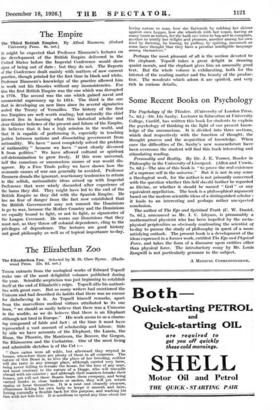The Elizabethan Zoo
The Elizabethan Zoo. Selected by M. St. Clare Byrne. (Ffasle- wood Press. 32s. 6d. net.) THESE extracts from the zoological works of Edward Topsell make one of the most delightful volumes published during
the year. Scientific scepticism was just beginning to establish itself at the end of Elizabeth's reign. Topsell sifts his authori- ties with great care. But so many writers had mentioned the Unicorn and had described its habits that there was no excuse for disbelieving in it. As Topsell himself remarks, apart from the marvellous medical virtues attributed to its one horn, " we should as easily believe that there was a Unicorne in the worlde, as we do beleevc that there is an Elephant although not bred in Europe." His work seems to us a charm- ing compound of fable and fact : at the time it must have represented a vast amount of scholarship and labour. Side by side we have accounts of the Elephant, the Lamia, the Bison, the Phoenix, the Mantieora, the Beaver, the Gorgon, the Rhinoceros and the Cockatrice. One of the most living and admirable sketches is of the Cat :-
"Once cattes were all wilds, but afterward they retyred to houses, wherefore there are plenty of them in all countries. The nature of this Beast is, to love the place of her breeding, neither will she tarry in any strange place, although carried very farm, being never willing to forsake the house, for the love of any man, and most contrary to the nature of a Dogge, who will travaille abroad with nis moister ; and although their maisters forsake their houses, yet will not these Beasts beam them company, and being carried forth° in close baskets or sackes, they will yet return again or loose themselves. It is a neat and cleanely creature, oftentimes licking his own body to keeps it smooth and faire, having naturally a flexible back for this purpose, and washing his face with her fore feet. It is needlesse to spend any time about her loving nature to man, how she flattereth by rubbing her skinne against ones Logges, how she whurleth with her voyce, having as many tunes as turnes, for she bath one voice to beg and to complain, another to testify her delight and pleasure, another among his own kind by flattring, by hissing, by puffing, by spitting, insomuch as some have thought that they have a peculiar intelligible language
among themselves." '
Perhaps the most pleasant of all is the section devoted to the elephant. Topsell takes a great delight in drawing quaint morals, and the elephant gives him an unusually good text. But the whole volume is exhilarating, both for the interest of the reading matter and the beauty of the produc- tion. The woodcuts which adorn it are spirited, and very rich in curious details.










































 Previous page
Previous page